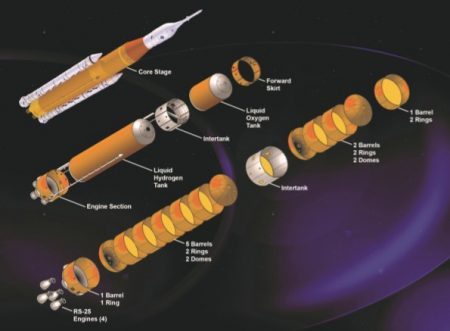March 14, 2019 – The Space Launch System that NASA has spent billions on remains a headache for the agency. A one-time use mega-rocket, purportedly the successor to the Saturn V of the Apollo Program, is over budget and well behind schedule. And as of yesterday, NASA has admitted that it is unlikely to be mission ready for an upcoming test of the Orion capsule mated to the SLS scheduled for June 2020.
Why NASA continues to believe in this project boggles my mind. Why?
- The SLS is a throwaway one-time use rocket.
- From the get-go its prime contractor, Boeing has been spending money at double the rate of the original plan and will have used up the entire contracted amount plus additional funds by early in 2020 without a deliverable to show for it.
- In a 2017 report, it noted that 72 cents of every dollar spent on SLS are being consumed by administrative overhead paid directly to the Agency and not to Boeing. If that is the case at present then it may explain why Boeing’s performance has been less than satisfactory.
- SLS is an old technology idea, a throwback to the days of the Saturn V and Apollo, while the International Space Station (ISS) has shown that smaller payload launches to low-Earth orbit, followed by assembly, is the future for building Deep Space launch capacity.
- SpaceX has demonstrated rocket reusability with the Falcon 9 and has the Falcon Heavy available now for large payload launch requirements.
The schedule for NASA’s rollout of SLS originally planned for a December 2017 launch with the Orion in an uncrewed voyage around the Moon. Now the target date is June 2020 and no SLS even close to ready to meet the launch window.
The second mission with a crew aboard was to happen in mid-2021. Now that date has slipped to 2022 and will likely be put off even further into the future as SLS continues to see completion dates slip.
In the latest audit of the SLS contract, published in October of last year, it states that Boeing will have spent $8.9 billion, double the budgeted amount for delivery of the core stage of the SLS. That’s not even the whole rocket.
Why has this happened?
The audit points to “Boeing’s poor performance.” How so?
- Underestimating the scope of the project
- Not meeting the workforce size requirements
- Underestimating the complexity of the hardware and software control system needed
- Equipment mishaps and extreme weather contributing to scheduling delays
The audit further points out that NASA oversight has been seriously lacking or slipshod with Boeing performance rating reports of “excellent” and “very good” issued leading to money being released to the company without work shown results that warranted these ratings. Nowhere in the audit does it refer to the 72 cents per dollar being spent on Agency administration of the contract which seems a bit strange. Instead the audit points out that NASA has been making attempts to implement better oversight (at what cost?) to ensure Boeing meets the SLS program objectives. Despite these changes, the audit concludes that contract performance in the future remains uncertain.
The audit proposes solutions that include a corrective task-based action plan, a renegotiation of the contract, federal government involvement in costing, a contracting officer in charge of and monitoring Boeing performance, and separate fixed-price, end-term deliverable payouts based on completion of each task.
What is an alternative launch strategy?
- Use the SpaceX Falcon Heavy to launch the Orion crew capsule to meet the June 2020 mission timeline.
- Develop a modular staging strategy using low-Earth orbit assembly similar to the building of ISS to become the launch platform for Deep Space exploration including a return to the Moon.
- Modify the Orion crew capsule by adding a docking assembly (it currently didn’t need one in the SLS scheme) so it can be mated to the modules placed in orbit.
NASA has the ability to do all these three strategies. Why no one at NASA has put this plan in place defies logic.









[…] NASA need the SLS? Back in 2019, I asked that question in a posting entitled, When will NASA abandon the SLS project? I argued against it for a number of reasons including: that SLS was old technology dressed up to […]
[…] in 2019, I asked the question, “When will NASA abandon the SLS Project?” At the time I noted that the SLS, the Space Launch System, a rocket purported to be the successor […]
[…] in 2019, I asked the question: When Will NASA Abandon the SLS Project? Now it appears that Boeing, the key contractor for the SLS is sensing the winds of change in […]